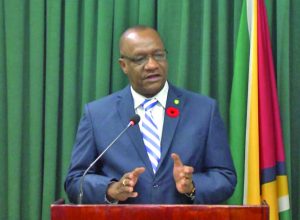Special Prosecutions Unit
Even as criticism continues to be heaped on the A Partnership for National Unity/Alliance For Change (APNU/AFC) Government over a decision to appoint special prosecutors for what it termed “high-profile cases”, the coalition has come out in full defence of the decision.
In recent days, criticism has been piling on the Government after it announced that it would appoint special prosecutors after investigations were concluded into cases involving Pradoville 2 and the Cricket World Cup among others.

news conference
Among the most vocal critics were former Attorney General Anil Nandlall and independent political analyst Ramon Gaskin.
However, speaking at a post-Cabinet news briefing on Thursday, Minister of State, Joseph Harmon, debunked statements that the initiative amounted to the Executive descending into prosecution – the remit of the Director of Public Prosecutions (DPP) and the Guyana Police Force.
“The Government does not prosecute. The Government provides information and the Police or special prosecutors prosecute,” Harmon told journalists.
He went on to explain that the special prosecutors would merely be representing the interest of the State in the courts and were not the ones who would investigate.
“These are people who will do the prosecution; these are not people who will do the investigations; the investigation is done by the Police and then that investigation is handed over for the prosecution in court,” Harmon stressed.
Executive influence
Harmon rubbished concerns that since the prosecutors would be selected by Attorney General Basil Williams, a member of the Executive, this could lead to interference in the process,
“There is nothing wrong with the AG being the Government’s legal adviser advising on the composition of a team. The AG will not be prosecuting himself, he will be identifying persons who have the capacity, the legal training and the background to be able to represent the State in these cases,” the Minister of State reasoned.
Nothing new
Harmon said that there was precedence in Guyana for the appointment of special prosecutors in high-level cases. He also took a swipe at Nandlall who he said was a special prosecutor in the Mark Benschop treason trial.
“The statements made by a certain gentleman that these people were to be dealt with by the DPP and that there should be no special prosecutors, that gentleman almost before the ink was dried on his Hugh Wooding Law School certificate was a special prosecutor in the Mark Benschop case for many months,” he explained, adding that “throughout time there have always been special prosecutors”.
He further explained that all that was required was the DPP issuing her fiat (A fiat is a short order or warrant of a Judge or Magistrate directing some act to be done; an authority issuing from some competent source for the doing of some legal act) for the special prosecutors to function.
Williams said earlier Thursday that the reason Government had to go down the route of special prosecutors was because staff from the DPP Chamber indicated they were uncomfortable with prosecuting these matters.
“They have suggested that they are political cases and some indicated they might have known the Minister, but largely because it is a political nature,” the Government Information Agency (GINA) quoted Williams as saying.
Unconstitutional
Meanwhile, on Wednesday, Gaskin waded into the Government for its decision, which he said was a blatant violation of the Guyana Constitution.
Gaskin made it pellucid that the Constitution stipulated that the Executive was barred from getting involved in prosecutions and emphasised the need for Government’s decision to be challenged in the courts.
He highlighted that the Constitution of Guyana provides only for the Director of Public Prosecutions (DPP) and the Guyana Police Force (GPF) to deal with matters involving prosecutions.
Article 122 says “there shall be an Attorney General of Guyana who shall be the principal legal adviser to the Government of Guyana and who shall be appointed by the President.”
Article 116 says “there shall be a Director of Public Prosecutions whose office shall be a public office.”
Article 187 outlines the DPP’s functions which include instituting and undertaking criminal proceedings against any person before any court, with the powers conferred upon the Director vested in him to the exclusion of any other person or authority and that Director shall not be subject to the direction or control of any other person or authority.
Article 187 also notes that the powers of the Director may be exercised through other persons acting under, and in accordance with, the Director’s general or special instructions.
Stakeholders’ silence
Gaskin also lambasted watchdog bodies such as the Guyana Bar Association (GBA); the Guyana Human Rights Association (GHRA) and the Transparency Institute of Guyana Inc (TIGI) for their evident silence on the matter.
When contacted, head of the GHRA , Mike McCormack said that his organisation did not examine the special prosecutors’ issue in isolation, but has been examining a raft of new measures, including legislation the Government, proposed and would make a comprehensive pronouncement on these issues in due course. He refused to give the GHRA’s initial position on the issue.
TIGI President, Dr Troy Thomas said he would be seeking legal guidance and promised to pronounce on the issue by Friday, while GBA head Gem Sandford-Johnson was said to be in a meeting and could not respond. Further calls to her mobile phone went unanswered.











